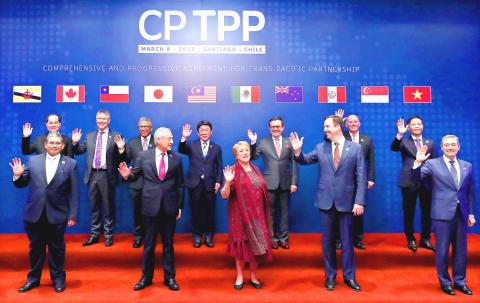The Ministry of Foreign Affairs pledged to continue to lobby for support regarding Taiwan’s participation in the Comprehensive and Progressive Agreement for Trans-Pacific Partnership (CPTPP), which came into effect yesterday.
The ministry congratulated CPTPP members in a statement, calling it an “important achievement” that was especially significant to the economic development of Asia-Pacific and the world.
The ministry also urged CPTPP nations to accept new members, including Taiwan, soon.

Photo: EPA-EFE
Taiwan’s participation would enhance the partnership and the economic development of the Asia-Pacific region, the ministry said.
“The ministry will continue to show CPTPP members the nation’s determination ... and promote its participation when the timing is appropriate,” it said.
Separately yesterday, Minister Without Portfolio John Deng (鄧振中) said that the government would apply to join the partnership near the end of next month, once the application procedures for new members become clearer.
Application procedures would likely be made apparent after the CPTPP nations hold a minister-level meeting in late January, said Deng, who doubles as head of the Executive Yuan’s Office of Trade Negotiations.
Joining the partnership is an important goal for Taiwan’s foreign policy, he added.
Following the passage of a Chinese Nationalist Party (KMT)-initiated referendum on Nov. 24 to ban food imports from five prefectures following the 2011 Fukushima Dai-ichi nuclear disaster, Japanese Minister of Foreign Affairs Taro Kono last month said that Tokyo did not rule out taking the issue to the WTO.
He also suggested that it would make Taiwan’s chances of joining the CPTPP — which is led by Japan — unlikely.
In response, Minister of Foreign Affairs Joseph Wu (吳釗燮) said he hoped that Taiwan’s participation would not be affected by a single issue.
The CPTPP, which replaced the Trans-Pacific Partnership after the US withdrew from the deal, was signed in March, and the agreement yesterday came into force for the initial six ratifying countries — Canada, Australia, Japan, Mexico, New Zealand and Singapore.
The free-trade agreement represents a market of about 500 million people and accounts for 13.5 percent of global trade.
The CPTPP’s 11 members account for 25 percent of Taiwan’s total foreign trade, with Japan, Singapore, Malaysia and Vietnam among the nation’s top 10 trading partners, while the 11 nations receive 30.42 percent of Taiwan’s outbound investment.
Additional reporting by Chen Yu-fu and CNA

US President Donald Trump yesterday announced sweeping "reciprocal tariffs" on US trading partners, including a 32 percent tax on goods from Taiwan that is set to take effect on Wednesday. At a Rose Garden event, Trump declared a 10 percent baseline tax on imports from all countries, with the White House saying it would take effect on Saturday. Countries with larger trade surpluses with the US would face higher duties beginning on Wednesday, including Taiwan (32 percent), China (34 percent), Japan (24 percent), South Korea (25 percent), Vietnam (46 percent) and Thailand (36 percent). Canada and Mexico, the two largest US trading

AIR SUPPORT: The Ministry of National Defense thanked the US for the delivery, adding that it was an indicator of the White House’s commitment to the Taiwan Relations Act Deputy Minister of National Defense Po Horng-huei (柏鴻輝) and Representative to the US Alexander Yui on Friday attended a delivery ceremony for the first of Taiwan’s long-awaited 66 F-16C/D Block 70 jets at a Lockheed Martin Corp factory in Greenville, South Carolina. “We are so proud to be the global home of the F-16 and to support Taiwan’s air defense capabilities,” US Representative William Timmons wrote on X, alongside a photograph of Taiwanese and US officials at the event. The F-16C/D Block 70 jets Taiwan ordered have the same capabilities as aircraft that had been upgraded to F-16Vs. The batch of Lockheed Martin

GRIDLOCK: The National Fire Agency’s Special Search and Rescue team is on standby to travel to the countries to help out with the rescue effort A powerful earthquake rocked Myanmar and neighboring Thailand yesterday, killing at least three people in Bangkok and burying dozens when a high-rise building under construction collapsed. Footage shared on social media from Myanmar’s second-largest city showed widespread destruction, raising fears that many were trapped under the rubble or killed. The magnitude 7.7 earthquake, with an epicenter near Mandalay in Myanmar, struck at midday and was followed by a strong magnitude 6.4 aftershock. The extent of death, injury and destruction — especially in Myanmar, which is embroiled in a civil war and where information is tightly controlled at the best of times —

China's military today said it began joint army, navy and rocket force exercises around Taiwan to "serve as a stern warning and powerful deterrent against Taiwanese independence," calling President William Lai (賴清德) a "parasite." The exercises come after Lai called Beijing a "foreign hostile force" last month. More than 10 Chinese military ships approached close to Taiwan's 24 nautical mile (44.4km) contiguous zone this morning and Taiwan sent its own warships to respond, two senior Taiwanese officials said. Taiwan has not yet detected any live fire by the Chinese military so far, one of the officials said. The drills took place after US Secretary